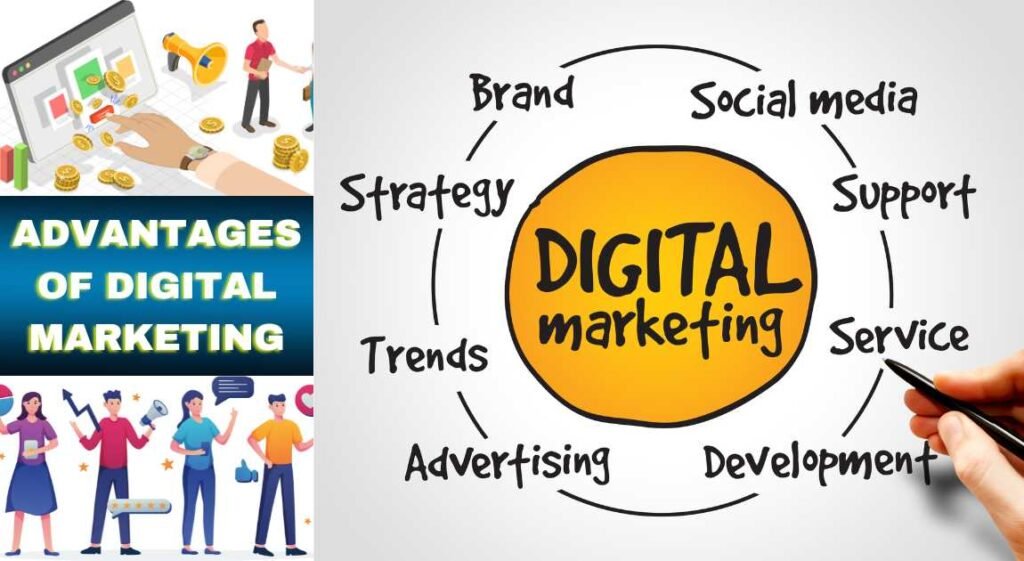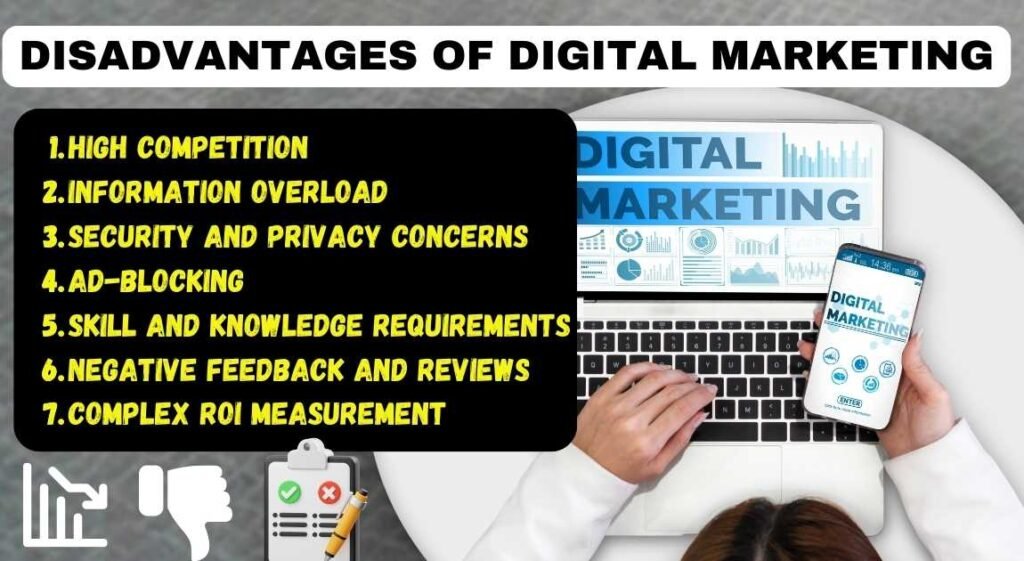Navigating the Top 10 Advantages and Disadvantages of Digital Marketing
Updated: 01 May 2024
29
Digital marketing uses electronic devices and digital channels to promote products or services. They were using email, social media, search engines, websites, and mobile apps to connect with likely clients.
Digital marketing is revolutionizing how companies operate and paving the way for their success. By leveraging digital media, companies can link with their target audiences, foster meaningful connections, and drive conversions. In this blog post, I will explore the Top 10 Advantages and Disadvantages of Digital Marketing.
What is Digital Marketing?
Digital marketing involves using online channels and technologies to promote products or services, encompassing SEO, social media, email, and content marketing.
Top 10 Pros and Cons of Digital Marketing
Uncover the top pros and cons of digital marketing strategies. From expanded audience reach and measurable ROI to challenges like ad saturation and data privacy issues, explore the nuanced landscape of digital marketing in the modern era.

Advantages of Digital Marketing:
Digital marketing has revolutionized how businesses interact with their audience and promote their products or services. It offers a plethora of advantages that have transformed the marketing landscape. Here are some critical pros of digital marketing.
1. Increased Reach: Digital marketing authorizes businesses to reach a global audience, breaking geographical barriers and expanding their customer base.
2. Targeted Marketing: Digital marketing enables precise targeting of specific demographics, interests, and behaviors, ensuring marketing efforts are found on the right audience.
3. Cost-Effective: Unlike traditional marketing channels, digital marketing often offers more cost-effective options, allowing businesses of all sizes to allocate their budgets more efficiently.
4. Measurable Results: Digital marketing provides robust analytics and tracking tools that allow businesses to read the effectiveness of their campaigns in actuality, providing valuable insights for optimization.
5. Improved Conversion Rates: With targeted marketing and personalized messaging, digital marketing can lead to higher conversion rates, as businesses can deliver tailored content to users at the right time in their buyer’s journey.
6. Enhanced Customer Engagement: Through social media, email marketing, and interactive content, digital marketing facilitates direct and meaningful customer interactions, fostering engagement and brand loyalty.
7. Accessible 24/7: Digital marketing channels are accessible around the clock, allowing businesses to engage with customers conveniently and meet their needs in real time.
8. Flexibility and Agility: Digital marketing campaigns can be quickly adjusted and optimized based on real-time data and customer feedback, allowing businesses to adapt to changing market conditions.
9. Brand Building: Digital marketing offers various channels and formats for showcasing a brand’s values, personality, and unique selling propositions, helping to build brand awareness and establish a solid online presence.
10. Integration with Traditional Marketing: Digital marketing can seamlessly integrate with traditional marketing strategies, amplifying their reach and effectiveness through cross-channel campaigns.

Disadvantages of Digital Marketing
While digital marketing offers numerous pros, businesses need to be aware of and address these cons effectively to maximize the potential of their digital marketing efforts.
1. Information Overload: With the abundance of digital content available, consumers can become overwhelmed, making it challenging for businesses to capture their attention and stand out.
2. Privacy Concerns: Digital marketing relies on data collection, which raises privacy concerns among consumers increasingly conscious of their personal information.
3. Ad Blocking: Many users employ ad-blocking software or plugins, which can significantly limit the reach and effectiveness of digital marketing campaigns.
4. Technical Issues: Technical glitches, such as website downtime or slow loading times, can hinder user experience and negatively impact the effectiveness of digital marketing efforts.
5. Ad Fraud: Digital advertising is susceptible to fraudulent activities like click and impression fraud, resulting in wasted advertising budgets and skewed campaign performance metrics.

6. Constantly Evolving Landscape: Digital marketing platforms evolve rapidly, requiring businesses to stay updated and adapt their strategies continually.
7. Intense Competition: The digital realm is saturated with competitors, making it challenging for businesses to differentiate themselves and capture their target audience’s attention.
8. Skill and Knowledge Requirements: Effective digital marketing requires specialized skills and knowledge, which may be a barrier for businesses needing more in-house expertise or resources.
9. Negative Brand Perception: Poorly executed digital marketing campaigns or negative online reviews can damage a brand’s reputation and diminish consumer trust.
10. Dependency on Technology: Digital marketing relies heavily on technology infrastructure and platforms, leaving businesses vulnerable to technical failures, cybersecurity threats, or algorithm changes.
Conclusion
In conclusion, digital marketing has emerged as a powerful force shaping the business’s future. Its advantages, including increased reach, targeted marketing, and measurable results, have revolutionized how companies connect with their audience.
However, it is crucial to know the potential cons, such as information overload, privacy concerns, and the need for continuous transformation. By understanding and navigating both the advantages and disadvantages, businesses can harness the transformative possibility of digital marketing to succeed in the ever-evolving digital landscape.
Why is digital marketing important?
Digital marketing is crucial because it enables businesses to reach a wider audience, increase visibility, generate leads, and achieve cost-effective marketing campaigns compared to traditional methods.
What are the critical components of digital marketing?
Key components include SEO (optimizing websites for search engine visibility), social media marketing, content marketing, email marketing, paid advertising, and analytics/reporting to measure campaign effectiveness.
How can businesses benefit from digital marketing?
Digital marketing benefits businesses by providing increased brand exposure, targeted audience reach, improved customer engagement, higher lead generation and conversion rates, cost-effective campaigns, and valuable customer insights.
How can I get started with digital marketing?
To begin, set clear goals, understand your target audience, choose relevant digital channels, create a strategy outlining tactics, and implement and measure your campaigns using analytics tools for continuous improvement.
Please Write Your Comments